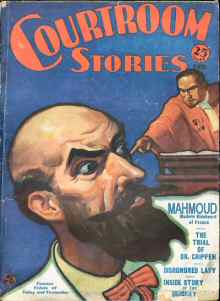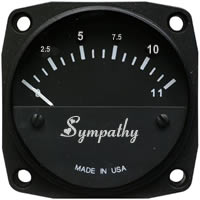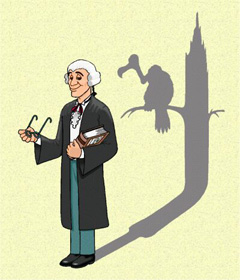A Spanish man facing terror charges scolded prosecutors and judges from the witness chair Friday as Europe's biggest al Qaeda trial opened in a heavily guarded courtroom here following eight years of investigation.
Luis Jose Galan, one of 24 defendants, all of whom are being tried together, declared his innocence and repeatedly contested questions put to him as inappropriate or impossible to answer.
Prosecutors say the defendants were part of a Spain-based cell of the global terror network that raised money and recruited fighters for radical Islamic causes in Bosnia, Afghanistan and Indonesia. Most face charges of financing terrorism and belonging to a terrorist organization, but three are specifically accused of assisting two of the ringleaders of the Sept. 11, 2001, attacks by organizing a rendezvous in a Spanish coastal town two months prior to the hijackings in the United States.
Spanish authorities imposed extra security for the trial, which is being conducted in a courthouse retrofitted especially for cases. Police helicopters and guards with automatic weapons patrolled the grounds. In the courtroom, all but one of the defendants sat on benches inside a large, bulletproof glass cage that isolated them from their attorneys, prosecutors and the three-judge panel hearing the case.
Spanish investigators amassed 300 boxes of evidence and an estimated 100,000 pages of documents, which were stacked along one wall. Much of the evidence in the case is circumstantial, and each defendant has asserted his innocence.
As is common practice in Spanish criminal trials, there were no opening statements. Instead, the proceedings began with a court clerk reading out the charges. Then, defendant Galan was called as the first witness. With questions, prosecutors laid out pieces of their case against him and sought his response.
A convert to Islam, Galan faces up to 18 years in prison for allegedly belonging to al Qaeda and illegally possessing weapons.
In an often feisty exchange with prosecutors and the presiding judge, he acknowledged owning guns and said he knew most of the other defendants. But he said he had permits for his weapons and had merely met his fellow suspects at a mosque. He insisted that none of his conduct was illegal.
Galan parried questions about a trip he took to Indonesia in the summer of 2001, shortly after the alleged leader of the cell, Imad Eddin Barakat Yarkas, visited that country in what prosecutors charge was part of a recruiting effort for Islamic fighters. While acknowledging that he traveled to Indonesia to pursue "business opportunities," he said was unable to recall many other details, including how he got there, how long he stayed and which parts of the country he visited. "I'm not very good with dates, but you have 300 volumes of paperwork over there, I'm sure you could find out when I went," he snapped at the lead prosecutor, Pedro Rubira.
When prosecutors asked him if he thought Yarkas, the alleged ringleader, had "radical" beliefs, Galan rolled his eyes in disdain and suggested that the judge rule the question as inappropriate. "Judge, please, I'm having difficulty here," he said. "The term 'radical' -- what does that mean?"
Yarkas is scheduled to testify next week. Prosecutors are expected to ask him about his alleged ties to the lead Sept. 11 hijacker, Mohamed Atta, and co-conspirator Ramzi Binalshibh. Yarkas is accused of helping to arrange a meeting between Atta and Binalshibh in Tarragona, Spain on July 16, 2001.
Court officials predict the trial will last at least four months. |
 The prosecutor's office at Spain's National Court has asked the tribunal not to issue an international arrest warrant for three US soldiers whose tank fired on a Baghdad hotel during the Iraq war, killing a Spanish journalist and one other, a court official said. Prosecutor Pedro Rubira said in his appeal: "Spain lacks jurisdiction to investigate causes of death in a military conflict and death of a Spanish citizen resulting from US military gunfire."
The prosecutor's office at Spain's National Court has asked the tribunal not to issue an international arrest warrant for three US soldiers whose tank fired on a Baghdad hotel during the Iraq war, killing a Spanish journalist and one other, a court official said. Prosecutor Pedro Rubira said in his appeal: "Spain lacks jurisdiction to investigate causes of death in a military conflict and death of a Spanish citizen resulting from US military gunfire."
 The trial of 24 people â Europe's biggest court case against radical groups with alleged ties to Osama bin Laden's network â ended Tuesday and the three-panel judge prepared to begin deliberations. Seven of the accused, including the alleged leader
The trial of 24 people â Europe's biggest court case against radical groups with alleged ties to Osama bin Laden's network â ended Tuesday and the three-panel judge prepared to begin deliberations. Seven of the accused, including the alleged leader  The wife of a Syrian-born journalist now on trial in Spain for alleged links to Al Qaeda said her husband Taysir Alony was arrested merely "for going his job well". In his closing statement at the trial of Alony and 23 others in Madrid, prosecutor
The wife of a Syrian-born journalist now on trial in Spain for alleged links to Al Qaeda said her husband Taysir Alony was arrested merely "for going his job well". In his closing statement at the trial of Alony and 23 others in Madrid, prosecutor 
 MADRID - Defence lawyers in Europeâs biggest trial of Al Qaeda suspects appealed Tuesday to Spainâs National Court to acquit suspects charged with helping to prepare the attacks of September 11, 2001 in the United States, warning the court against sentencing âscapegoatsâ on flimsy evidence.
MADRID - Defence lawyers in Europeâs biggest trial of Al Qaeda suspects appealed Tuesday to Spainâs National Court to acquit suspects charged with helping to prepare the attacks of September 11, 2001 in the United States, warning the court against sentencing âscapegoatsâ on flimsy evidence. A co-defendant told police that a key al Qaida suspect — who earlier this week called himself a peace-loving moderate Muslim — is a radical who recruited men for "holy war" training in Afghanistan, according to testimony read to a Madrid court today.
A co-defendant told police that a key al Qaida suspect — who earlier this week called himself a peace-loving moderate Muslim — is a radical who recruited men for "holy war" training in Afghanistan, according to testimony read to a Madrid court today.